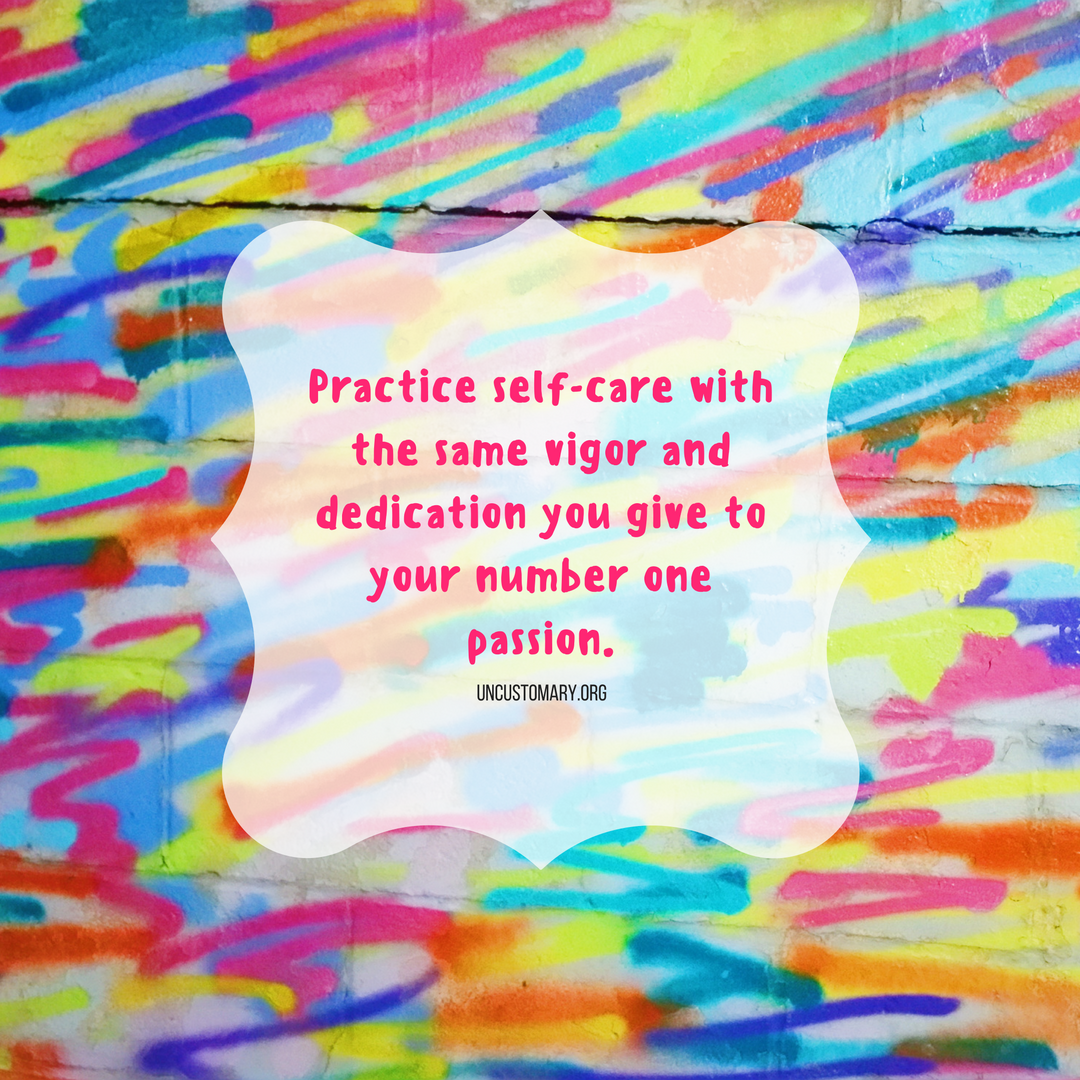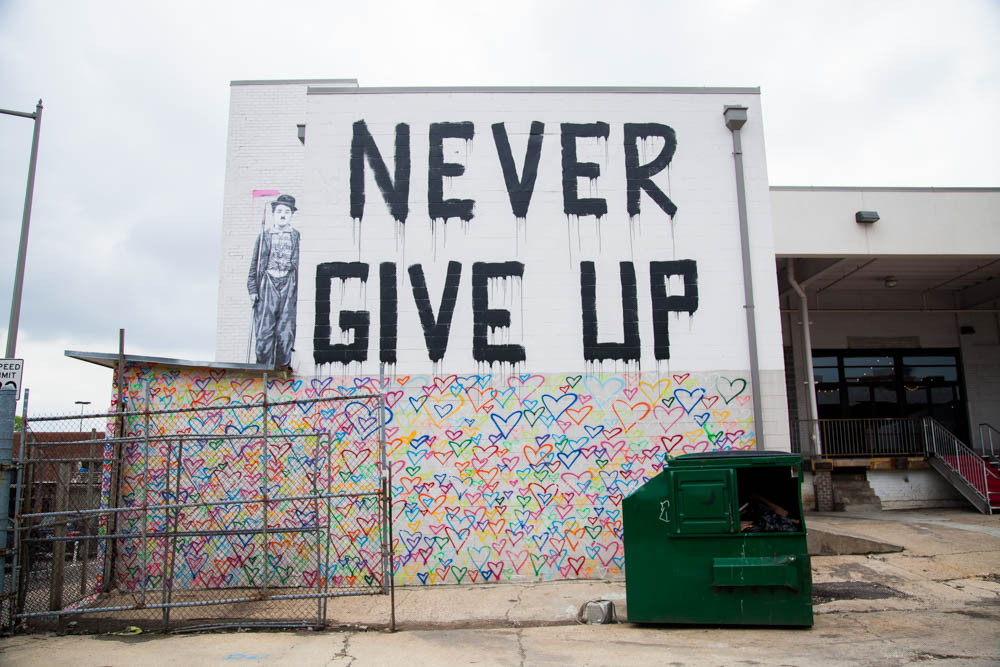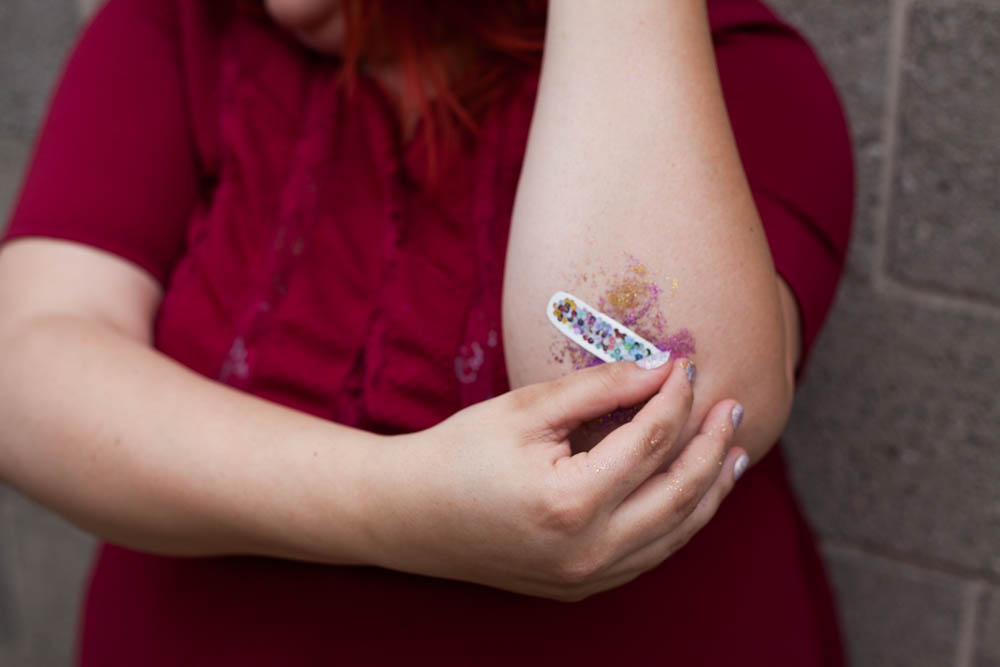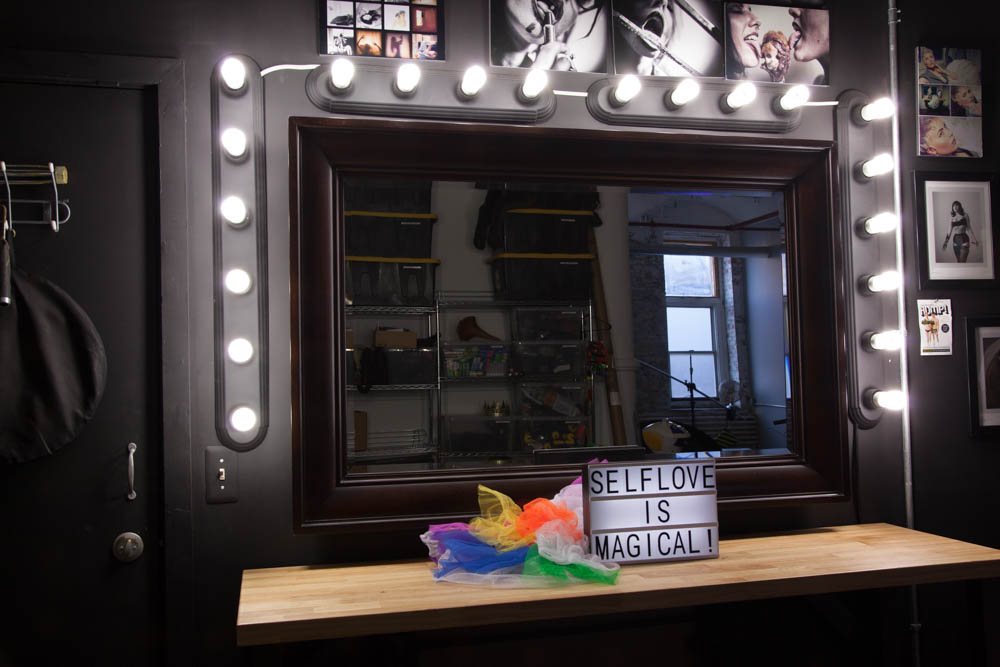
Recently, I launched a free self-care e-course. In my free courses, I send daily lessons, but before we start anything I ask a “pre-homework” question where I encourage the students to e-mail me back with their main concern or past issue with this topic. So in this case, I asked what the hardest part of practicing self-care has been in the past. More than a third of the responses have been “chronic illness”. I was blown away by how common that answer was. I realized I had no resources like blog articles or podcasts to reference for these people. I didn’t have any specific answers for them because I don’t have chronic illness, but I really wanted to have those answers so I outsourced it.
It’s always great for someone to provide their take on a topic if they’re on the other side of it. For example, it’s interesting and valuable for a man to give his perspective on feminist issues (especially as an ally), but as much as that man might sympathize with the struggles women face in the world, we still don’t want that man in charge of any definitive decisions about our bodies, choices, and lives. At the end of the day, the only person who should be deciding what is discriminating, legitimate, or anything else should be a person who has personally experienced that struggle. For example, you can grow up with someone who has a mental illness and get more perspective into that world than someone who has no experience but until you actually experience mental illness in your own mind there are certain things you can only sympathize with.
That’s why I decided to interview eight people with chronic illness and use their answers to provide a resource for others. For you or your best friend’s sister. None of the information provided below is my own, because I don’t have chronic illness and am therefore ineligible to give advice on the topic, but from people who live every day with chronic illness and took the time to share their insight. I’m so grateful for them.
Before I get into the two main questions I asked each person, I want to make sure we’re all on the same page as far as what chronic illness is:
Chronic illness can take so many different forms, symptoms, and diagnoses. Basically, it’s a health condition/disease that gives the person experiencing it symptoms which affect their daily life. Clinically, for it to be a “chronic” illness, the symptoms need to persist for more than three months. Three months out of an entire lifetime might not seem life-changing, but here’s the reality: 1) Most people with chronic illness experience their symptoms for years, decades, and sometimes their entire lives and 2) Even three months of miserable symptoms is too much; no one deserves it.
Technically, we could look at chronic illness as including mental illness because it meets the criteria. However, because I have so much personal experience with that topic, I made sure that the people I interviewed for this post had a physical illness. That is not to diminish the severity or harsh reality of someone living with a chronic mental illness, but I decided it was important for me to make that distinction for this specific post.

You might have heard the term “Spoonie” before in relation to chronic illness. That’s not always a term whose definition is common knowledge, so I wanted to explain it simply:
You know how we have the expression, “I don’t give any fucks” or “I don’t have any more fucks to give”? It’s like that, but with spoons. The idea is when you wake up every day a person is given X amount of spoons. For every struggle you experience that day, you lose a spoon. Imagine you had a day where you wake up late, spill coffee on your outfit on your commute, get fired at work, and on your ride home your car stops working on the highway during a thunderstorm. That’s a pretty shitty situation, right? Extreme as it is, I think it’s safe to say by the time you’re on the shoulder of the road trying to open the hood of your car or call for help, you are officially “out of spoons”. That doesn’t mean you can’t function at all, but you’re likely to be snippy with people you interact with or completely overlook things you never would have missed in the beginning of the day. You want nothing more than to curl up in bed and fade to unconsciousness because you are out of spoons.
Well, someone with chronic illness starts each day with less spoons than someone without chronic illness. And not only that, but each struggle they experience requires many more spoons than an able-bodied person would have to give up for that same struggle. They run out of spoons so much easier than they would otherwise, thus developing the nickname most use with a term of endearment: “Spoonie“.
Okay! Moving forward. The people I interviewed have a large variety of diagnoses including Fibromyalgia, Ehlers-Danlos Syndrome, Chronic Fatigue Syndrome, Hemiplegic Migraines and a variety of versions of Chronic pain, ranging from Endometriosis to still undiagnosed. (Side note: a hugely unfortunate part of chronic illness is it can take months and years for someone to be accurately diagnosed with what is wrong, therefore making it much harder to effectively treat. It can be an extremely stressful and unnecessary addition to the already shitty situation.) We also have a person who not only have a physical chronic illness but mental illness and Autism, as well as a person who has been a caregiver to someone with a chronic illness for over twenty-five years.
What is the hardest part of practicing self-care while dealing with chronic illness?
“I feel like I need to push through the pain to finish things. I don’t like to give myself the grace to know that things can wait. Also, it’s incredibly difficult at times to love yourself because your body feels like it betrays you.” (Yvonne)
“I feel like my life revolves around this monster inside of me (the loving term I use for my uterus) and I catch myself letting the pain consume me which just lets me beat myself up further for letting the pain take control. It is mentally and physically exhausting.” (Brittany)
“The hardest part of loving myself and self-care is the indifference you feel about your daily life, your body and your mental health.” (Kafi)
“I have very unpredictable income. Those living with chronic illness do best under the “treat yo self” mentality for self care because amenities make our quality of exponentially better. I like to be able to order take out so I don’t have to cook or clean up after, but I can’t always afford it even if I don’t have the energy to cook.” (Currie)
“Many people (and especially able-bodied people) have made it challenging for me to accept that my illnesses are valid and that I am worthy of dignity, love, and self-care. I’m still trying to overcome the feelings of worthlessness that often come with being disabled in this society.” (Erica)
“Learning my boundaries and respecting them has been really important for me since I generally feel fine as long as I stay away from certain strenuous activities. Finding ways to challenge myself in terms of staying active without pushing my body too far has been more difficult than I ever expected. Not beating myself up when I can’t do the things I feel like I should be doing or when I have to cancel plans last minute because I’m in pain is an ongoing struggle for me.” (Kaitlyn)
“I undervalue myself due to my illness. I was told often that I was too young to be that sick. I was bullied into second guessing what I was feeling. I half-convinced myself that if I just tried hard enough, I wouldn’t be sick. I ignored symptoms and refused to report symptoms to my doctor because I thought that they were normal or made me sound like an attention seeker. I denied myself medical care, wouldn’t eat properly, and generally punished myself for being weak. This was especially true if I failed to uphold a commitment. I’ve improved greatly since then and still have trouble caring for myself when illness strikes.” (Kitty)
“I think the hardest thing about learning self care is learning to accept that something is wrong with you, even when doctors (and others) say other wise. It’s learning to listen to your body first and foremost. Those two lessons were the hardest and I still forget when I think one day I can just be normal, but that’s not the case. I always pay for good days. It’s learning to accept and work with yourself first that was the hardest.” (Cody)
35 Self-Care Tips For People With Chronic Illness
- “Asking for help is ok! (My family knows how strong willed I am so they don’t want to offend me by doing things for me and many times (ok basically all of the time) when they offer to help me I say ‘no’. Then on the off chance I ask for help, or accept someone’s offer to help I feel so relieved, and things get done (dishes, laundry, a night to myself because someone is babysitting) and it makes the person helping me feel good too!)” (Brittany)
- “Make a check list for basic self care. If you’re feeling bad and can’t figure out why, a checklist helps get all the basics accomplished and then you’ll start to feel more clear headed (Have I eaten? Have I had water? Have I showered? Am I wearing clean clothes? Etc. It seems like basic stuff to the able bodied and minded but sometimes it’s not so easy for us.)” (Currie Lee)
- “Make a self-care basket. This way when you really need to take a moment to yourself EVERYTHING will be in one place.” (Yvonne)
- “Talk to someone about how you feel. (I go months at a time fighting this fight on my own, trying to be strong for everyone around me. Put a smile on and fight through the pain. I have a background in psychology so I think that I can handle the feelings and emotions on my own. WRONG! I’ve been to counseling (for other issues, but my health did come up) and it was one of the best things I’ve ever done. When I get to a breaking point I talk to my husband about how angry or frustrated or guilty I feel and though he can’t fix the physical pain, just his understanding and reassurance lift a huge weight off my shoulders and make me feel not so alone and very very loved.)” (Brittany)
- “Forgive your body for disappointing you sometimes. You did nothing to deserve to hurt. Don’t punish yourself for perceived failures. Be gentle and compassionate with yourself.” (Kitty)
- “Give yourself grace and/or meet yourself where you are… the amount of time you have for self-care might be small or the amount of time you can stand to do it even, but you have to know that and meet yourself where you are and relax properly.” (Yvonne)
- “Small accomplishments are BIG Victories! (I used to set ridiculous expectations for myself. Take care of a one year old monster who gets into literally EVERYTHING, keep the house spotless, dishes, laundry, bathrooms, run all of the errands, while working three days a week and spending every weekend with extended family running here and going there. At the end of the day I’d look around at the clutter and dishes and laundry and realize I had accomplished NOTHING. I would feel so useless and depressed and convinced myself I was a failure. My counselor helped me realize I was being totally unrealistic with my expectations. Now, I make a smaller more realistic list and if I accomplish one thing on that list it’s been a good day. It could be as small as ‘unload the dishwasher’ or ‘take a shower’. I am very okay with that now.” (Brittany)
- “Accept you are who you are. Your illness might get better but it might not. Working with yourself where you are is the first start.” (Cody)
- “Sex and/or masturbation are healthy, valid forms of self-care. There is a lot of sex-negativity that people with chronic illnesses face. There is the notion that because we are chronically ill, the last thing on our minds should be our sexuality and that we should not waste our very limited energy on sex or masturbation. We need to fight this sex-negativity and assert our right to be sexual beings.” (Erica)
- “Go outside and breathe even if it is for two minutes. Suns and air are healing.” (Kafi)
- “Allow yourself to use the Internet without guilt. I’ve found that a lot of people with chronic illnesses (and especially those of us who cannot work) use the Internet more than the average person. And that is okay! Don’t feel guilty about your Internet usage.” (Erica)
- “I would advise anyone with a chronic illness to build a support network. Don’t be ashamed to ask for that help. You don’t have to do it alone.” (Kitty)
- “Sometimes you have to allow yourself the easiest solution even if you’ve promised yourself you would stop (i.e. sometimes all I have to eat is bread and I can’t leave the house, even though gluten occasionally makes me feel sicker, I eat it anyway because it’s better than wasting away on my bed being hungry.)” (Currie Lee)
- “Have a self-care plan. Know that self-care doesn’t have to take a long time. You can do something in three minutes or you can take an hour. A self-care plan will help you look at what you can do in the time you have.” (Yvonne)
- “Find doctors or specialists you trust. Of course, there are certain limitations to this because of insurance plans, but finding someone you’re comfortable with can make a huge difference in treatment, especially if you have to see somebody on a regular basis. If you don’t fully trust your doctor or if you don’t think their approach to your treatment is a good match for you, find somebody else! If you can’t communicate openly with your doctor, they might not be able to provide you with the care you need. Self-advocacy is a huge part of self-care in my opinion.” (Kaitlyn)
- “Acknowledge the body you have instead of mourning the body you had.” (Kafi)
- “Do what you can when you can. I tend to get discouraged when I set out to do something only to get shut down by pain. I push myself to try but also accept the things my body is telling me. Some days I might want to go for a long walk, or clean the house, or go out with friends but my body isn’t up to it. I do as much as I can and rest when my body tells me I need to.” (Kaitlyn)
- “Find the right health care professional and use them. (I went through five OB/GYNs before finding one who took me seriously. I tried everything the others recommended and when I said I was still in pain they scratched their heads or gave me more birth control or told me to “just have a baby”. I have finally found a doctor that has been proactive in my treatment. He has uncovered several conditions we all thought were the cause of the pain and he treated each one aggressively and effectively. Though I know something is still not right as I’m still in pain he has not ignored my cries for help. He continues to give me options and takes my personal life and choices into account until the inevitable hysterectomy will “cure” me once and for all.) Don’t be afraid to tell your doctor something isn’t right, pursue them until they fix it, or find a new doctor!” (Brittany)
- “It sounds simple, but when my body is hurting my favorite thing to do is to put on fuzzy fleece pajama pants, super soft socks, and a comfy shirt. It actually takes a good deal of pressure off of my body (and my mind) when I’m not wearing tight jeans or uncomfortable shoes. Comfy pajamas can fix pretty much everything.” (Kaitlyn)
- “Communicate. You have to tell your friends and family what you need or else they won’t be able to help you get that time.” (Yvonne)
- “Don’t be afraid to spend extra money on something if it is going to make your life easier.” (Currie Lee)
- “Something I always tell myself and taken as my life motto “Take one day (and sometimes one moment) at a time”. Living with chronic illness means that you’re going to have really bad days. Once accepting those days, I think learning to practice different self-care ways as the days come could be very valuable.” (Cody)
- “Stick to a routine. Getting enough sleep is a key factor in managing my pain. Since I also have disordered sleep, going to bed and waking up at roughly the same time every day is the best way to ensure I get enough. Keeping a routine also helps me notice patterns with my symptoms like what time of day they tend to be particularly bad or what specific activities or situations make them worse. Third bonus: it’s easier to remember if you’ve taken daily medications if you do it at the same time every day.” (Kaitlyn)
- “Learn to measure your energy in increments and treat your energy like currency. When performing a task or engaging in something, always always ask yourself, ‘Can I afford this?”” (Kafi)
- “Share your story. Not only will this help you mentally by getting your thoughts and feelings out, you may help others too. Someone may be suffering from the same condition but they’ve been afraid to talk about it before, or they may not even have a diagnosis if they haven’t brought it up with their doctor. You could discover someone you already know has a similar condition and find support there or create new friendships through existing support groups. Spread the word and spread your knowledge! Someone could benefit from your experience and you may benefit from others’.” (Brittany)
- “Remind yourself your body is still amazing. Chronic illness or no, your body deserves to be pampered every now and then. Get a massage, take a bubble bath, buy some fancy smelling lotion. All the usual self-care tips still apply.” (Kaitlyn)
- “Find a community. We all deserve to feel a sense of community. Because many people with chronic illnesses cannot leave the house much, our sense of community is often limited. I suggest you seek out some community (either online or in-person). You can join a church (or other house of worship), go to a group at a local library, join some Facebook groups, etc.” (Erica)
- “Find some hobbies you enjoy. They can be as low-key as crocheting or something more active, like taking dance classes.” (Erica)
- “Follow Through. Make the appointments you need to make; check ups, specialist visits, therapy, testing… all of it. Refill your prescriptions. Don’t talk yourself out of doing these things because you feel discouraged or, on the other hand, if you feel like your symptoms aren’t bad enough to warrant things like this. I’m admittedly horrible about this. I say to myself all the time, ‘Well I haven’t had any pain in a little while. I probably don’t need that follow-up appointment’, and then, sure enough, the pain comes back. If your condition is chronic in nature consistency is key.” (Kaitlyn)
- “Move your body. For those with chronic illness, it may be as simple as sitting up in bed and breathing deeply.” (Kafi)
- “Invest in a quality reusable heat pad. I got one from Walgreens for about $15 and it does wonders. Mine is electric but there are also aromatherapy ones that go in the microwave. Try to find one that’s easy to clean. The one I got has a cloth cover that I just toss in the washing machine. In a pinch, soak a wet wash cloth or small towel in hot water and put it over whatever parts of your body are sore. Great for menstrual cramps too!” (Kaitlyn)
- “Think of all the tremendous things your body is doing right instead of beating yourself up for the things that aren’t working so well. Focusing on the positive things and expressing gratitude (even if it’s just in your head) changes your entire perspective and boosts your mood. Yoga is an excellent tool to grow this skill (plus it’s a gentle way to exercise). There are tons of guided meditations or even hypnosis videos on YouTube that focus on body positivity. Even if they aren’t specifically for your illness, they can be helpful to cultivate an optimistic attitude about your body.” (Kaitlyn)
- “Drink water/Take a bath.. It seems simple but, when you’re dehydrated it’s difficult for your body to heal or even maintain your new normal. A healing bath has given respite even when my pain levels were off the charts.” (Kafi)
- “Don’t keep friends who don’t listen to your needs/limitations or try to able-splain you. No one has time for bad friends. Let them go.” (Currie Lee)
- “Remember that self-care is an important investment. This investment requires time, money, and energy. Allow yourself to invest in self-care.” (Erica)
It’s important that you understand that making any changes can be difficult, no matter how big or small. You should consider that it’s okay to make small changes, or by living a slight edge-type lifestyle. You don’t have to make those huge changes overnight, and you may stand a much better chance to slowly work at it in your own way. Everyone has their own pace and capabilities, and you shouldn’t expect too much from yourself.
Podcast!
I can’t thank these people enough for sharing their extremely valuable and insightful tips. I wanted to take it a step further, and asked two of these women to join me in a podcast where we dive deeper into this topic. I hope you’ll check it out.
Contributors
[pextestim pex_attr_name=”Cody Doll” pex_attr_img=”https://uncustomary.org/wp-content/uploads/2016/11/IMG_20161020_061032.jpg” pex_attr_org=”Instagram” pex_attr_link=”https://www.instagram.com/codydollartist/” pex_attr_parallax=”disabled”]A creative who suffers with an unknown chronic illness.[/pextestim]
[pextestim pex_attr_name=”Brittany Krok” pex_attr_img=”https://uncustomary.org/wp-content/uploads/2016/11/12185162_10100286506991529_8976682853776725254_o.jpg” pex_attr_org=”Facebook” pex_attr_link=”https://www.facebook.com/brittany.krok” pex_attr_parallax=”disabled”]Brittany is a mother, wife, crazy-oldest-sister, suck-up-first child, Harry Potter enthusiast, craft supply hoarder, beach lover (also sea shell hoarder), wannabe photographer, perfectionist with a messy house, coffee-hating but hot tea-loving, part-time electronics assembly technician who wishes she was a stay-at-home mom![/pextestim]
[pextestim pex_attr_name=”Kafi D’Ambrosi” pex_attr_img=”https://uncustomary.org/wp-content/uploads/2016/11/image.jpeg” pex_attr_org=”Instagram” pex_attr_link=”http://instagram.com/studiokafi” pex_attr_parallax=”disabled”]Kafi D’Ambrosi is an artist, pbotographer, a caregiver and health advocate for herself and for others. She is a self-described ‘spoonie’ and has fought her way through, endometriosis, chronic fatigue syndrome, fibromyalgia and has survived blindness, preeclampsia and early term pregnancy among other ‘invisible’ illnesses. She’s been a caregiver for friends going through trauma and cancer and always advises “Press the pain button”and that “Laughter is the best medicine”[/pextestim]
[pextestim pex_attr_name=”Currie Lee” pex_attr_img=”https://uncustomary.org/wp-content/uploads/2016/11/IMG_4289.jpg” pex_attr_org=”Instagram” pex_attr_link=”http://instagram.com/cvrrielee” pex_attr_parallax=”disabled”]Currie Lee is a fashion photographer and blogger who lives and works in Baltimore, MD. Her hobbies include discovering new restaurants, petting cats, and listening to sad music.[/pextestim]
[pextestim pex_attr_name=”Erica Durante” pex_attr_img=”https://uncustomary.org/wp-content/uploads/2016/11/10492074_10204541669325353_2799492792960393105_n.jpg” pex_attr_org=”Blog” pex_attr_link=”http://www.extraordinaryerica.com/” pex_attr_parallax=”disabled”]Erica is an artist living in New Jersey[/pextestim]
[pextestim pex_attr_name=”Kaitlyn Haney” pex_attr_img=”https://uncustomary.org/wp-content/uploads/2016/11/2016-08-29-11.59.02-1.jpg” pex_attr_org=”Instagram” pex_attr_link=”https://www.instagram.com/pandxa” pex_attr_parallax=”disabled”]Kaitlyn is a student and freelance photographer. Her ultimate goal is to find a way to merge my mental health studies with her passion for creativity, art, and alternative therapies to help people suffering from mental health problems.[/pextestim]
[pextestim pex_attr_name=”Kitty Perkins” pex_attr_img=”https://uncustomary.org/wp-content/uploads/2016/11/20160603_2258081-1.jpg” pex_attr_org=”Facebook” pex_attr_link=”https://m.facebook.com/KittyKitz-1105101632904280″ pex_attr_parallax=”disabled”]Kitty is an office administrator by day and an artist. She’s living my life to the fullest every day while working to realize her dreams.[/pextestim]
[pextestim pex_attr_name=”Yvonne Marcus” pex_attr_img=”https://uncustomary.org/wp-content/uploads/2016/11/Engagement-Photo-1.jpg” pex_attr_org=”Website” pex_attr_link=”http://www.thedahliascene.com/” pex_attr_parallax=”disabled”]Yvonne Marcus is passionate about helping moms to mom their way. She is a lifestyle and clarity coach for moms. Her major passion is helping you to go from hot mess to got it together by creating a #momlife that you want to live aka you won’t turn into your mom![/pextestim]
Do you have any advice to add? I’d love to hear more perspectives, especially from men since we only had women contribute to this particular post. You might also be interested in this additional resource on Chronic Depression. Let’s continue the conversation in the comments section!













I am a chronic patient who is living on life-support and is now doing well and am on my way to being a healthcare professional. Many of these tips are great and I do most of them myself. I am currently creating a special information site for this category of people. But I only have a knowledge of certain illnesses and ailments. So I am keen to have others join me in looking after other patients. As you say we need more men on board because many men are afraid to go for professional help and unfortunately end up where I am – on life-support because they didn’t seek help soon enough.
I shall take many of these tips and add them to my site – still in the early stages. The head of my site will be a different bible verse each month, related to self-care.
I read a post written by someone who had just developed gastro-paresis, begging for help just to get comfortable. This was my reply.
Hot water bottles, heating pads, and warm baths help with cramping. When my stomach is “all blown up” as I call it, I use a pregnancy massage technique called “effleurage “. Lamaze techniques help with the pain, or, at least, it keeps me from hyperventilating.
I’ve talked to other people with chronic illness and a lot of us find sleeping on a pile of pillows helpful. It’s like the ultimate adjustable bed.
There’s lots of foods that can help with heartburn besides milk: some coat your stomach to protect it from excess acid, some sort of soak it up: peanut butter, bananas, any kind of bread, rice, pasta, etc. my ultimate go-to food for burning is shells and cheese.
I don’t really have any helpful advice for nausea except learn your limits and keep an “upchuck bucket” by the bed just in case. I have been known to store anti-nausea meds in my bra if I don’t have pockets or a purse.
If I’m nauseated but I need food, I choose something that will be the least unpleasant coming up later.
Hard candy can help. Try Simpkins. You have to order them from England but their original purpose was to help Victorians with “Dyspepsia “ and they WORK. Dunno why, but they do. They will also get rid of any foul taste that may hang on from medications.
Hot tea is good for soothing a cramping stomach and a sore throat, iced cream or popsicles can help with a sore throat too. If you drink soda to help with nausea, the clearer the better. Ginger Ale is not just an old wives’ tale, it has been proven to help. Ginger bread or ginger cookies are excellent too, but difficult to find.
Don’t try to force yourself to sleep if you’ve still got adrenaline from pain rushing through your veins. Rest, but keep your mind occupied with whatever helps you to relax. Books, movies, bad tv, candy crush, angry birds, whatever works.
I had no idea I’d taught myself so much just to get into a comfortable position.
One of the overlooked chronic illnesses is Post-Polio Syndrome. You have paralytic polio as a kid, get over it, and go on to live a productive life…until…. You’re in your 40s or 50s and all of a sudden you have weakness on one side, or you feel fatigue half-way into your day, or you have severe muscle spasms in your ribs, your legs, your feet, etc. It takes doctors 10-20 years to diagnose you, because some of the younger ones have never had to deal with polio. When you’ve had polio, you lose 2/3 of the nerves which govern your muscles. You’ve been living a productive life, but with only 1/3 of the nerves you should have. By the time you’re 50, your nerves are tired of trying to keep up and they can’t control your muscles as well as they used to. I’m lucky. I’m a writer, and I work from home. When I’m tired, I can quit work and rest. That’s the key with PPS. Rest. You can’t “push through your day” any more. Your nerves just can’t keep up. Pineconepapers.com has a wonderful Flare Tracker that I’ve found helpful. I’ll take it to my neurologist the next time I go, so he can see if the meds are working, if the need to be upped or changed.
Amazing… I have s chronic illness with no help. Drs do not care. Have no idea how to treat me. Deny me care through the emergency room. I have reactivated and I’m laying in bed feeling like I’m dying and no one can do anything for me. My family does not get it. My husband checked out we have no money. So I deal with the consistent fevers, pains, swelling of my nodes, can’t swallow, sleep all day and night and wish in my dreams s dr might be sympathetic and help me, find out why my bodies dying. I have not met one yet. Only mean pysvhians that misdiagnosis and could care less. I never go to the emergency room why? To get shit on
Alcohol Abuse Programs Inpatient Drug Rehabilitation substance abuse outpatient services Best Inpatient Rehab Methadone Clinic Near Me
http://www.solutions-to-drug-addiction.drugrehabssr.com